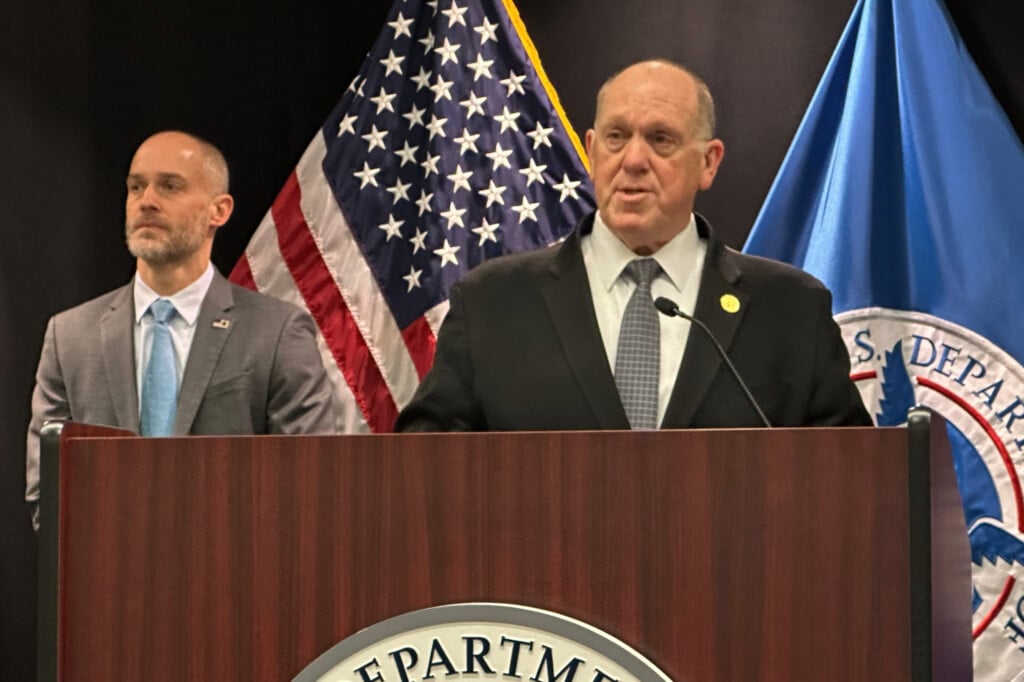Trump officials text attack plans to a group chat in secure app that included a journalist

Defense Secretary Pete Hegseth does a television interview outside the White House, Friday, March 21, 2025, in Washington. (AP Photo/Jacquelyn Martin)
Top national security officials for President Donald Trump, including his defense secretary, texted plans for upcoming military strikes in Yemen to a group chat in a secure messaging app that included the editor-in-chief for The Atlantic, the magazine reported in a story posted online Monday.
The National Security Council said the text chain “appears to be authentic.”
Trump initially told reporters he was not aware that the highly sensitive information had been shared, 2 1/2 hours after it was reported. He later appeared to joke about the breach.
The material in the text chain “contained operational details of forthcoming strikes on Iran-backed Houthi-rebels in Yemen, including information about targets, weapons the U.S. would be deploying, and attack sequencing,” editor-in-chief Jeffrey Goldberg reported.
It was not immediately clear if the specifics of the military operation were classified. The U.S. has conducted airstrikes against the Houthis since the militant group began targeting commercial and military vessels in the Red Sea in November 2023.
Just two hours after Goldberg received the details of the attack on March 15, the U.S. began launching a series of airstrikes against Houthi targets in Yemen.
The National Security Council said in a statement that it was looking into how a journalist’s number was added to the chain in the Signal group chat. In addition to Defense Secretary Pete Hegseth, it included Vice President JD Vance, Secretary of State Marco Rubio and Tulsi Gabbard, Trump’s director of national intelligence.
Goldberg said he received the Signal invitation from Mike Waltz, Trump’s national security adviser, who was also in the group chat.
Hegseth in his first comments on the matter attacked Goldberg as “deceitful” and a “discredited so-called journalist” while alluding to previous critical reporting of Trump from the publication. He did not shed light on why Signal was being used to discuss the sensitive operation or how Goldberg ended up on the message chain.
“Nobody was texting war plans and that’s all I have to say about that,” Hegseth said in an exchange with reporters after landing in Hawaii on Monday as he began his first trip to the Indo-Pacific as defense secretary.
Trump on Tuesday in a brief interview with NBC News’ Garrett Haake downplayed the incident as “the only glitch in two months” of his administration “and it turned out not to be a serious one.”
White House press secretary Karoline Leavitt on Tuesday said in post on X that no war plans were discussed and that “No classified material was sent to the thread.”
Leavitt said on Monday the president still has the “utmost confidence” in Waltz and the national security team. Trump told NBC News on Tuesday that Waltz “has learned a lesson, and he’s a good man.”
Government officials have used Signal for organizational correspondence, but it is not classified and can be hacked. Privacy and tech experts say the popular end-to-end encrypted messaging and voice call app is more secure than conventional texting.
Leavitt said the White House counsel’s office has provided guidance to Trump’s top officials on a number platforms to communicate as safely and efficiently as possible.
The handling of national defense information is strictly governed by law under the century-old Espionage Act, including provisions that make it a crime to remove such information from its “proper place of custody” even through an act of gross negligence.
The Justice Department in 2015 and 2016 investigated whether former Secretary of State Hillary Clinton broke the law by communicating about classified information with her aides on a private email server she set up, though the FBI ultimately recommended against charges and none were brought.
In the Biden administration, some officials were given permission to download Signal on their White House-issued phones, but were instructed to use the app sparingly, according to a former national security official who served in the Democratic administration.
The app was sometimes also used by officials during the Biden administration to communicate about scheduling of sensitive meetings or classified phone calls when they were outside the office, the official said.
The use of Signal became more prevalent during the last year of the Biden administration after federal law enforcement officials warned that China and Iran were hacking the White House as well as officials in the first Trump administration, according to the official.
Signal’s encryption protocol is open source, meaning that it’s freely available for anyone to inspect, use or modify. The encryption protocol is also used by another popular chat service, social media company Meta’s WhatsApp platform.
In the chain of messages, Vance questioned whether Americans would understand the importance of strikes that came with the risk of “a moderate to severe spike in oil prices” and if the timing of the operation might be a “mistake.”
“I am willing to support the consensus of the team and keep these concerns to myself,” Vance argued. “But there is a strong argument for delaying this a month, doing the messaging work on why this matters, seeing where the economy is, etc.”
Vance also made the case that Europe would benefit much more than the U.S. by the action aimed at decimating the Houthis and securing Red Sea shipping lanes.
“If you think we should do it let’s go. I just hate bailing Europe out again,” Vance said in a back-and-forth with Hegseth.
“I fully share your loathing of European free-loading. It’s PATHETIC,” Hegseth replied. He added, “I think we should go.”
The vice president’s communications director, William Martin, released a statement downplaying the debate. He said Vance “unequivocally supports this administration’s foreign policy.”
(Copyright 2025 The Associated Press. All rights reserved. This material may not be published, broadcast, rewritten or redistributed.)






